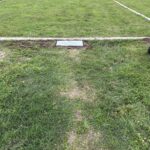Dream for America
On August 28, 1963, I had been three years old for just a few weeks. President Kennedy was still alive. And Dr. Martin Luther King, Junior, spoke at the Lincoln Memorial in Washington, DC, sharing his dream for America.
He opened the rally with this statement, “I am happy to join with you today in what will go down in history as the greatest demonstration for freedom in the history of our nation.†So far, no freedom event has topped this speech. To this day, it remains the greatest demonstration for freedom in the history of our nation.
In an environment when many people seem to toss the words “discrimination†and “racism†at every slight. In an environment where it is seemingly acceptable to attempt to quash any disagreement with an accusation of “racism,†I ask you to review your history. I would agree that racism is more subtle today. You might have to look harder to find it. On the other hand, if you look hard enough you can twist anything to mean something. I don’t want to trivialize this subject, but it begins to look like transference of one’s own shortcomings onto someone else. Before you accuse someone else of racism, examine your own soul to ensure there’s no racism there.
I was fortunate enough during my times in Montgomery, AL, to be able to tour some of the Civil Rights locations. There’s a lot of Civil Rights history in and around Montgomery, and many good things happened to bring an end to organized discrimination there. Rosa Parks, notable for refusing to give up her seat on a city bus to a white man, sparked a 381-day bus boycott in that city. Dr. Martin Luther King, Jr., was senior pastor at the Dexter Avenue Baptist Church, now a National Historic Landmark. The parsonage he and his family lived in is now a museum — a must not miss stop if you’re ever in Montgomery.
In 1963, one hundred years after Lincoln’s Emancipation Proclamation, the Negro (using Dr. King’s word, here) in America was still not free. Forty-seven years later, we have a very different environment.
We have come further in the forty-seven years since that speech than in the previous hundred years before that. We haven’t completely realized the dream yet — human nature, being what it is, may not let it be fully realized, but we need to take stock of where we are today in contrast to where we were then. Acknowledge and celebrate the long, long way we’ve come along the path laid out for this journey, and look with yearning, joy, and a willingness to work to the future, because for this dream to achieve further realization, everyone must work toward the common goal laid out for us.
If you haven’t already done so, go listen to and/or read Dr. Martin Luther King, Jr.’s “I Have A Dream†speech. And if you aren’t aware of our history and what black people could and could not do in this country in the early 1960s and before, please do a little studying. You can start here at this PBS site.


